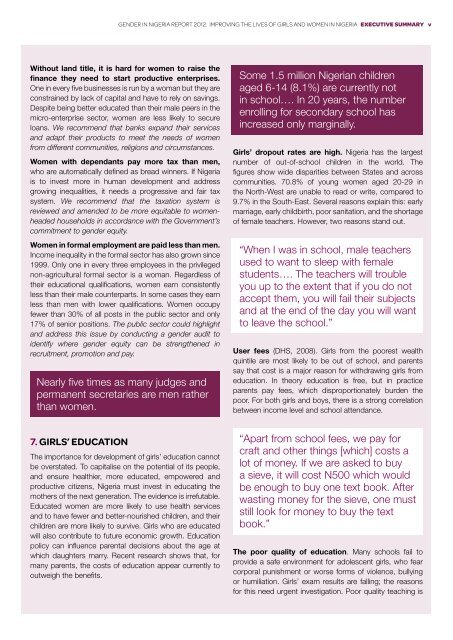Gender in niGeria report 2012 - Economic Commission for Africa
Gender in niGeria report 2012 - Economic Commission for Africa
Gender in niGeria report 2012 - Economic Commission for Africa
You also want an ePaper? Increase the reach of your titles
YUMPU automatically turns print PDFs into web optimized ePapers that Google loves.
<strong>Gender</strong> <strong>in</strong> Nigeria Report <strong>2012</strong>: Improv<strong>in</strong>g the Lives of Girls and Women <strong>in</strong> Nigeria executive summary v<br />
Without land title, it is hard <strong>for</strong> women to raise the<br />
f<strong>in</strong>ance they need to start productive enterprises.<br />
One <strong>in</strong> every five bus<strong>in</strong>esses is run by a woman but they are<br />
constra<strong>in</strong>ed by lack of capital and have to rely on sav<strong>in</strong>gs.<br />
Despite be<strong>in</strong>g better educated than their male peers <strong>in</strong> the<br />
micro-enterprise sector, women are less likely to secure<br />
loans. We recommend that banks expand their services<br />
and adapt their products to meet the needs of women<br />
from different communities, religions and circumstances.<br />
Women with dependants pay more tax than men,<br />
who are automatically def<strong>in</strong>ed as bread w<strong>in</strong>ners. If Nigeria<br />
is to <strong>in</strong>vest more <strong>in</strong> human development and address<br />
grow<strong>in</strong>g <strong>in</strong>equalities, it needs a progressive and fair tax<br />
system. We recommend that the taxation system is<br />
reviewed and amended to be more equitable to womenheaded<br />
households <strong>in</strong> accordance with the Government’s<br />
commitment to gender equity.<br />
Women <strong>in</strong> <strong>for</strong>mal employment are paid less than men.<br />
Income <strong>in</strong>equality <strong>in</strong> the <strong>for</strong>mal sector has also grown s<strong>in</strong>ce<br />
1999. Only one <strong>in</strong> every three employees <strong>in</strong> the privileged<br />
non-agricultural <strong>for</strong>mal sector is a woman. Regardless of<br />
their educational qualifications, women earn consistently<br />
less than their male counterparts. In some cases they earn<br />
less than men with lower qualifications. Women occupy<br />
fewer than 30% of all posts <strong>in</strong> the public sector and only<br />
17% of senior positions. The public sector could highlight<br />
and address this issue by conduct<strong>in</strong>g a gender audit to<br />
identify where gender equity can be strengthened <strong>in</strong><br />
recruitment, promotion and pay.<br />
Nearly five times as many judges and<br />
permanent secretaries are men rather<br />
than women.<br />
Some 1.5 million Nigerian children<br />
aged 6-14 (8.1%) are currently not<br />
<strong>in</strong> school…. In 20 years, the number<br />
enroll<strong>in</strong>g <strong>for</strong> secondary school has<br />
<strong>in</strong>creased only marg<strong>in</strong>ally.<br />
Girls’ dropout rates are high. Nigeria has the largest<br />
number of out-of-school children <strong>in</strong> the world. The<br />
figures show wide disparities between States and across<br />
communities. 70.8% of young women aged 20-29 <strong>in</strong><br />
the North-West are unable to read or write, compared to<br />
9.7% <strong>in</strong> the South-East. Several reasons expla<strong>in</strong> this: early<br />
marriage, early childbirth, poor sanitation, and the shortage<br />
of female teachers. However, two reasons stand out.<br />
“When I was <strong>in</strong> school, male teachers<br />
used to want to sleep with female<br />
students…. The teachers will trouble<br />
you up to the extent that if you do not<br />
accept them, you will fail their subjects<br />
and at the end of the day you will want<br />
to leave the school.”<br />
User fees (DHS, 2008). Girls from the poorest wealth<br />
qu<strong>in</strong>tile are most likely to be out of school, and parents<br />
say that cost is a major reason <strong>for</strong> withdraw<strong>in</strong>g girls from<br />
education. In theory education is free, but <strong>in</strong> practice<br />
parents pay fees, which disproportionately burden the<br />
poor. For both girls and boys, there is a strong correlation<br />
between <strong>in</strong>come level and school attendance.<br />
7. Girls’ education<br />
The importance <strong>for</strong> development of girls’ education cannot<br />
be overstated. To capitalise on the potential of its people,<br />
and ensure healthier, more educated, empowered and<br />
productive citizens, Nigeria must <strong>in</strong>vest <strong>in</strong> educat<strong>in</strong>g the<br />
mothers of the next generation. The evidence is irrefutable.<br />
Educated women are more likely to use health services<br />
and to have fewer and better-nourished children, and their<br />
children are more likely to survive. Girls who are educated<br />
will also contribute to future economic growth. Education<br />
policy can <strong>in</strong>fluence parental decisions about the age at<br />
which daughters marry. Recent research shows that, <strong>for</strong><br />
many parents, the costs of education appear currently to<br />
outweigh the benefits.<br />
“Apart from school fees, we pay <strong>for</strong><br />
craft and other th<strong>in</strong>gs [which] costs a<br />
lot of money. If we are asked to buy<br />
a sieve, it will cost N500 which would<br />
be enough to buy one text book. After<br />
wast<strong>in</strong>g money <strong>for</strong> the sieve, one must<br />
still look <strong>for</strong> money to buy the text<br />
book.”<br />
The poor quality of education. Many schools fail to<br />
provide a safe environment <strong>for</strong> adolescent girls, who fear<br />
corporal punishment or worse <strong>for</strong>ms of violence, bully<strong>in</strong>g<br />
or humiliation. Girls’ exam results are fall<strong>in</strong>g; the reasons<br />
<strong>for</strong> this need urgent <strong>in</strong>vestigation. Poor quality teach<strong>in</strong>g is

















